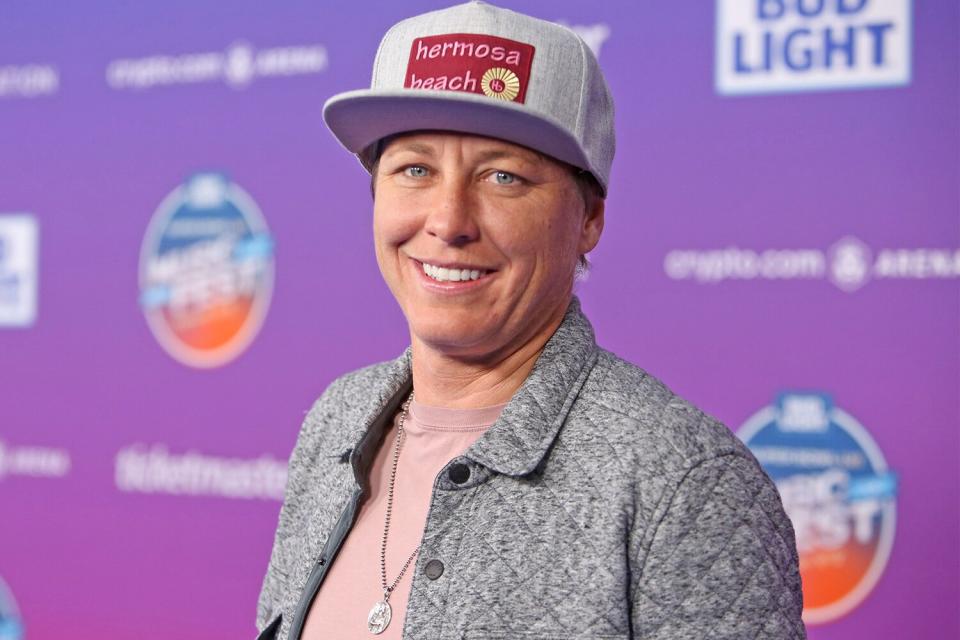Abby Wambach Says USWNT Equal Pay Victory Is a 'Huge Deal' for 'Women Everywhere'
- Oops!Something went wrong.Please try again later.
- Oops!Something went wrong.Please try again later.
Former soccer star Abby Wambach is so proud of the big moves the U.S. Women's National Soccer Team has made for equality in sports.
In an exclusive interview with PEOPLE about her podcast We Can Do Hard Things with wife, author Glennon Doyle, Wambach opened up about her reaction to the USWNT's legal victory over the U.S. Soccer Federation in February.
The USWNT and the U.S. Soccer Federation confirmed in a February statement that an agreement had been reached following a class action lawsuit. The women's team, including multiple stars of 2019 World Cup-winning team, accused the U.S. Soccer Federation of gender discrimination. A settlement agreed upon between the two parties rewarded the women's team with a $22 million payout and an additional $2 million to go to the USWNT players' post-career goals.
Wambach, 41, told PEOPLE that the impact goes beyond this one case. "It's a huge deal because it's also not just a statement for this team and soccer," she said.
"This is a statement for women everywhere," Wambach said, adding that women in any industry can benefit from the verdict. "Another woman looking at an article, or hearing or reading this can think to themselves, 'Wait, am I getting paid the same as my male counterparts? How should I figure that out?' "

Jesse Grant/Getty
RELATED: U.S. Soccer Agrees to Pay U.S. Women's National Team $22 Million in Equal Pay Lawsuit Agreement
"I'm so happy for them," Wambach told PEOPLE, despite the change coming after her own career on the field ended. "I feel 5% jealous that I wasn't on the team when this equal pay settlement happened. But the truth is, things happen when they're meant to happen."
The National Soccer Hall-of-Famer explained that the move in the right direction has been a long time coming: "The day that it happened, I just found myself texting all of the people that weren't on the actual settlement that still had so much to do with it. Mia Hamm, Julie Foudy, former presidents of U.S. Soccer."
Never miss a story — sign up for PEOPLE's free daily newsletter to stay up-to-date on the best of what PEOPLE has to offer, from juicy celebrity news to compelling human interest stories.
Wambach continued, "The former lawyers that are no longer a part of the current team, but still did their small steps, their small parts to get this team to a place where they could put their foot down and say, 'You know what? Enough is enough. And we deserve to be treated equally.' "
The agreement followed a complaint filed with the Equal Employment Opportunity Commission in 2016 by five U.S. Women's National Team players — Morgan, Rapinoe, Becky Sauerbrunn, Hope Solo and Carli Lloyd — who alleged unequal pay between men's and women's teams.
In 2019, nearly 30 USWNT members filed a lawsuit against the U.S. Soccer Federation for "institutionalized gender discrimination," and argued that they received less pay and poorer treatment than the men's team.
Wambach's wife Doyle told PEOPLE that she and the former athlete have learned a lot from the USWNT's legal victory. "We talked about, in terms of what this team did that was different," she said. "They just didn't allow the pandering s---. They demanded the numbers."
RELATED: Glennon Doyle Says She Had to Share Bulimia Relapse on Her Podcast: 'It Was Hard for Me Not To'
"For so many years they've been like, 'Oh, it's OK. Here's a new jersey. Here's a new women's empowerment thing,' " Doyle explained of the federation's history of implementing performative changes rather than equal pay. "We are learning from the new generation of like, 'Oh, we don't listen anymore.' "
"So, what an organization tells us they are with words, we're demanding to see numbers. We need to have organizations stop waving flags and start waving budgets, environmental reports. So we're learning from the young generation about how to get s--- done," Doyle told PEOPLE.

